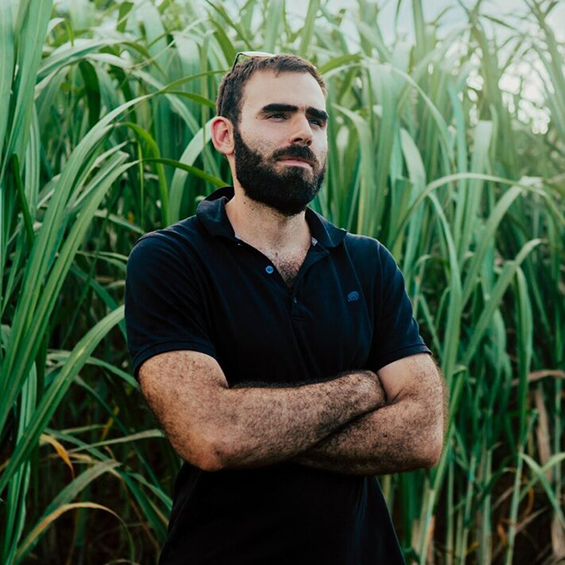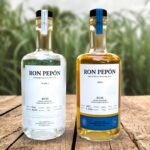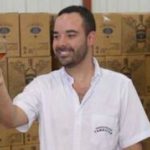Rum Connoisseur Interview of the Week JOSE R ALVAREZ LEFRANC San Juan Artisan Distillers – VPMaster Distiller
Rum Connoisseur
Interview of the Week

JOSE R ALVAREZ LEFRANC
San Juan Artisan Distillers
VPMaster Distiller
-
Who is Jose R. Alvarez Lefranc?
I was born and raised in Puerto Rico; I am an Engineer by education and work as Vice President of San Juan Artisan Distillers, the makers of RON PEPON and TRESCLAVOS. I make the rums, manage the operations, and oversee the administration of the distillery. I am a Partner alongside my father, Pepe Alvarez, President, of San Juan Artisan Distillers.
I grew up loving soccer, studying Civil Engineering in Mayaguez, Puerto Rico, and working for Coca-Cola for a year before I started working for my father in the Distillery. I started learning about Rum 15 years ago, have been mentored by my father and Frank Ward among other Rum Consultants. I’m married to Ashley Gonzalez and live in Vega Alta, PR, 5 minutes from the distillery.
-
What does the rum mean for you? What made you fall in love with rum and when did it happen?
I fell in love with the opportunity to make exceptional quality Handcrafted Artisanal Rum in Puerto Rico and make a sustainable business/distillery that could operate and compete against the Duopoly of Bacardi and Don Q. We became the first and only estate distillery that was dedicated to planting and harvesting sugarcane and making Ron Agricola for our product RON PEPON, the only rum made with sugarcane juice in Puerto Rico, from farms we manage. Also, TRESCLAVOS, inspired by our local moonshine, is a product made from locally sourced fruits and handcrafted in our distillery. The idea for these rums sprang from my father’s innovative spirit and the need to re-invent us almost 15 years ago during the great recession; I supported him from the very beginning.
Rum means the expression of the land and people who work to produce a Spirit, made from sugarcane and its derivatives. We saw the opportunity of making rum differently from what is common in Puerto Rico, with the different source material and made with higher quality as opposed to quantity.
-
Three essential characteristics that define the rum according to your perspective.
Rum can be made in many different ways, as long as it’s made with integrity, honesty, and sustainably.
-
What is the most important contribution you have made in the rum industry?
I feel like I’m just starting! I do feel proud of getting a gold medal in the Fifty Best competition for White Rums in NYC; it was a valuable recognition of our early efforts. Most importantly is building and operating a sustainable Rum Distillery in Puerto Rico, against all odds. My father, Pepe, deserves recognition for his determination and drive in building the distillery, and for giving me the tools to make rum. We are showing the Rum Industry what can be done with passion and determination, and my father and I have a long way to go.
-
Benefits that the rum industry has given you.
It has given me a job I love, an opportunity to learn about my culture, about our land and sugarcane, and of course an appreciation and knowledge of a craft I can make and enjoy with others.
It has also allowed me to work with industry giants like Frank Ward from Mount Gay Distillers fame, and Phillipe Bannier from Chalvignac manufacturers; and local pillars of the Puerto Rico rum industry like Dr. Jorge Rodriguez who ran Bacardi as a manager for decades, and Luis Planas from Bacardi fame as well, who now heads Barrilito.
-
What’s another thing you are passionate about, in addition to rum? Why?
Besides rum, I enjoy making beer, sustainable farming and gardening, and making fermentable goods. I enjoy reading about the industry, markets, and real estate. Play soccer sometimes.
-
What is your favorite place for drinking rum?
I enjoy drinking Rum after a long day’s work at the distillery, with co-workers, friends, and family, experimenting with recipes for cocktails, and doing blind tastings.
-
Favorite drink + Recipe
It depends on the mood; I enjoy our Ron Pepón Añejo straight or in an Old Fashioned, or any cocktail with Ron Pepón Blanco or TRESCLAVOS products. I’ve been enjoying the Jungle Bird recently: 2 oz of Sweet Piña (TRESCLAVOS), 3 oz of Pineapple Juice, half an ounce of Campari, shaken and strained on a tall glass with ice, with a splash of Blanco, garnish.
-
Why is it important to educate the rum consumer?
Consumers should be educated on anything they consume, that way they know how it’s made and where it came from. This knowledge will help you choose which practices you choose to promote. With regards to Rum, consumers should promote honest rum makers and sustainable operations. Traditionally, Rum makers don’t have a good reputation for honesty and transparency, and that needs to change.
-
Any tips to train the palate and taste a good premium rum?
You need practice and theory, to learn how to appreciate and distinguish good rum. Practice you get from tastings, experimentation, and nose. The theory you get from reading rum books and blogs like The Lone Caner, hearing podcasts like the Rum Cast, and good mentorship. Also supporting initiatives like the Rum Lab!
-
How can rum contribute to improving the crisis in some countries?
Sustainable farming, promote local farmers to produce Sugarcane. And governments, associations, and media should incentivize and promote not just rum, but the new and small family businesses for the alcohol beverage industry. There are so many interesting and new things that can be done at a local and community level that are instead dominated by huge Corporations who only think of profit.
-
Is the commitment to sustainable development the key to success for the permanence of the rum industry in the world? Why?
There is a place for global industrial rum operations, as long as they are sustainable and benefit local communities. But the key to sustainable development is making rum at the community and family level, made with local produce. It’s not only better for everyone economically and Health wise, but it tastes better as well.
-
Who would like to meet in the rum industry? What would you say to him/her?
I would like to meet Richard Seale. “How can we collaborate?”
-
What are your next goals in the rum industry?
To scale up our Rum production and our sugarcane farms. Bring out two new rums this year. Among them, RONSANTO, from the TRESCLAVOS brand, is the only rum collaboration between the Dominican Republic and Puerto Rico, a two-year-aged blended rum we hope to launch this year. We also want to start selling in the US and EU, increase volume and maintain quality.
-
Plans you have when you leave the rum industry.
I hope our Company is renown around the world for quality, sustainability, and honesty. I would like to see clear classifications for Rum, and sustainable operations in the Caribbean and rum producing countries.
-
Why is the role of the bartender important in the rum industry?
Bartenders are the best Brand Ambassadors. They are the connection between Rum producing operations and consumers. They help choose rum profiles and know the consumer better than anyone.
-
What is your advice for new generations in the rum industry?
Work with your local farmers, support your local restaurants and bars, employ your community, and make quality Rum with integrity and honesty. The consumer will follow.
-
How can people learn more about you? Website? Social media page?
I am quite a private person, but I’ll open an Instagram account in the future, to showcase my day-to-day operations in the distillery.
Instagram: https://www.instagram.com/sanjuanartisandistillers/
Facebook: https://www.facebook.com/sanjuanartisandistillers/





